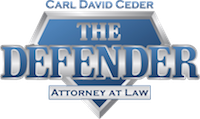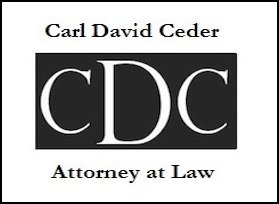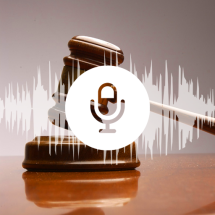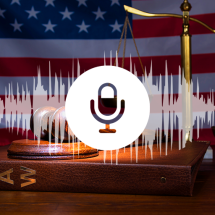Texas Criminal Case Process
If you, or a loved one, is possibly facing a criminal accusation, or have already been arrested for a crime, you are likely scared, frightened, and confused. The steps you take in handling the situation can have repercussions that can last a lifetime.
First and foremost, it is highly advisable to employ the legal services of a skilled, experienced, and knowledgeable criminal defense attorney. If you are reading this, we hope this information can give you a general understanding of how the criminal case process works. This is not intended to serve, in any way, legal advice. However, you can contact The Ceder Law Firm for assistance at 214.702.CARL(2275) or at 469.2000.DWI(394). You can also e-mail Carl directly, at [email protected]; or to the office for general inquiries at [email protected]. a case for a contested hearing.
Types of Criminal Offenses
Generally speaking, criminal offenses in Texas will be categorized in one of two ways: felonies and misdemeanors.
A felony charge is alleged criminal activity {that is serious and can have serious and severe consequences and penalties imposed as punishment. It is possible that if convicted of a felony, an individual could serve time in the Texas Department of Corrects (“TDC”), or more commonly known as prison. A misdemeanor is a criminal offense that is considered less serious, in comparison, to those classified as felonies. Within each classification the degree, severity and seriousness and which can result in consequences for punishment are different.
Arrest
Before arresting an individual, generally speaking, a police officer must have a warrant. Absent having a warrant, a police officer must have probable cause to believe that someone committed an offense, or an offense is committed in the presence of the officer. In these situations, a warrant is not required to make an arrest. If you have been arrested and a police officer makes it known that you are not free to leave then you need to understand your rights. Even if the police officer does not know you were actually under arrest work which you in handcuff,s still may be under arrest. Regardless if you are arrested and/or questioned by the police need to understand your rights.
Your Rights
You have basic fundamental rights after an arrest is made. Some of these rights include after being arrested, it is required that you are taken, without delay, to a magistrate or a Judge. This magistrate or a Judge must then advise you of any accusations against you, any affidavits filed regarding the accusations, your right to retain legal counsel, your right to remain silent, your right to have an attorney present during any interviews, your right to terminate any interviews at any time, your right to request a court-appointed lawyer, your to have a fair trial, and your right not to make a statement that may be used against you. It must also be afforded the right to have a reasonable amount of time to contact an attorney.
If the crime is a felony offense, you have the right to NOT be prosecuted until a grand jury convenes. You also have the right to be presumed innocent (the presumption of innocence, the 5th amendment right not to incriminate yourself, right to a speedy trial, the right under the confrontation clause to confront any witnesses who will bear testimony against you, and the right to an appeal.
The Arraignment
The arraignment is the initial appearance before the judge where you will enter a plea, ask to post bail, and, if you cannot afford one, have a public defender appointed. Once arrested, a formal accusation of the activity alleged to be made by the accused will be brought and presented against the defendant. This can include but is not exclusive of police reports generated statements made by witnesses, and any other evidence. Someone from the District Attorney’s office usually will announce the charge or charges at the arraignment. Only the prosecuting attorney’s office has the authority to drop or bring charges against you, although their decisions can sometimes be influenced by the victim.
Bail Bond
Bond money that is paid for a Bail amount for the defendant to be released from jail is money paid to the court to guarantee your presence at court at a later date. If the bail bond amounts if found to be excessive, motions to reduce bail can be filed and a hearing sought for the review to request the Judge to reduce the amount. After you have been arrested, Texas law allows for your confinement only for a limited amount of time, which is usually up to three days. to hold you for a limited amount of time.
Discovery
After the case is filed with the District Attorneys office, the defense will then be able to request full discovery related to the offense changed. This process is commonly referred to as “discovery.” In federal cases, the government can request and has the right, generally speaking, than do prosecutors do at the state level. During discovery, typically, the following is exchanged: police reports, videos relating to the alleged incident, victim statements, diagrams, any expert analysis and/or results, medical records, photographs, and other relevant evidence, whether written or physical.
First Appearance
The accused is then expected to make a “first appearance” in court. The first appearance is usually where the accused informs the court whether or not they have hired an attorney, or if they have not, whether they want to apply to be represented by a court-appointed attorney. Often, if the accused hires an attorney the first appearance can be waived if a “letter of representation” is filed. Carl does this immediately after being employed as legal counsel on a criminal case to hopefully minimize time clients actually have to attend court. He is respectful of the fact that people often have work and other professional and personal obligations during the day that cannot be completed if they have to make additional time to attend various court settings. The attorney will can then begin the process of requesting all discovery that may be relevant, as noted above, which can include police reports, videos relating to the alleged incident, victim statements, diagrams, any expert analysis and/or results, medical records, photographs, and other relevant evidence, whether written or physical in the prosecutor’s possession. After that, the court will give you a new court date for your first “announcement” setting. You WILL NOT be required to enter a plea or set your case for trial at the first appearance setting. Typically, you will do no more than sit in the gallery of the court during the first appearance process. The first appearance, and how it is conducted, does vary from county to county and by each court.
Announcement Settings
The next settings are most commonly referred to as “Announcement” settings. Several court appearances usually occur where discovery is obtained. An attorney is also usually given a chance to discuss the facts surrounding the arrest with the prosecutor assigned to the case. Whether the defendant is required to attend these settings is dependant on whether the charge is a felony or a misdemeanor, and also on which court the case is pending. A punishment recommendation is usually presented to the attorney by the prosecutor based on the strengths and weaknesses of the state’s case. Several settings usually occur before a case will be disposed of. During these initial settings, an attorney should request and obtain all police reports (and video and audio recordings) that will be used against the accused in the criminal case. An announcement setting more or less means that an attorney will “announce” the case for a plea, or for trial. This is usually an informal process and can take multiple court dates over the course of a few months. If the accused needs more time to investigate the case, then more announcement settings can be requested. The number of announcement settings usually depends on the court and the judge where the case has been assigned. It should be expected that the attorney representing the defendant in these proceedings should carefully review all information pertinent to the case. After a meticulous review of the facts, the attorney should make a decision as to how best proceed next. Whether your appearance is required varies by county and which court you may be assigned.
Possible Preliminary Proceedings
Experienced and knowledgeable criminal defense attorneys often use the preliminary proceedings to possibly expose the prosecution’s case and to solidify their witness list in preparation for trial. The most common preliminary proceedings would be certain pretrial issues, such as a motion to suppress possible evidence, motion for a change of venue, motions to sever counts, motions to compel additional discovery, and any other possible motion filed that needs to be addressed prior to proceeding to trial. The judge makes the final decision on each issue.
Plea Setting
If a case is set on a plea docket setting, the case likely will be disposed of. If you decide not to fight your case, you will enter into a plea bargain agreement with the prosecution. In If a case is set on a plea docket setting, the case likely will be disposed of. At this point, the attorney and the defendant should have made a decision to dispose of the case given whatever factors are involved. Before you make a decision on how to dispose of your case, the attorney should carefully review your case to possible detect if there are any legal deficiencies or factual problems with the evidence the state may have that may warrant a reduction or a dismissal of the charge. After the attorney has completed this analysis, it should be then determined based on everything related to the case, and all the pros and cons associated, with either entering a plea of guilty and setting your case for trial. Remember, an attorney cannot directly advise and direct you to either pled guilty or proceed to a trial. Doing so, in theory, is against the professional rules of ethics and is the decision that the defendant should make themselves. However, the attorney must carefully examine and explain all available options clearly and with whatever information is available so the best-informed decision possible can be made.
At this point, the attorney and the defendant should have made a decision to dispose of the case given whatever factors are involved. If the accused agrees to a given plea bargain made by the state, the person has agreed to waive certain rights. These rights include 1) the right to a jury trial; 2) the right to confront witnesses against them; 3) and usually the right to appeal the case after it is disposed of. You must also give the court an affirmative affirmation that you are “knowingly and voluntarily” waiving these rights in order to enter the plea. The plea can either be a “No-Contest” plea (if the court allows), or a plea of “Guilty.” Once the agreement is accepted and the plea is entered, the accused usually will be given certain requirements to follow afterward and usually as a condition of probation. Usually, this involves an agreed upon probationary period, where the accused agrees to follow certain guidelines to complete the probation successfully. Fines, court costs, probation fees, and any jail time will also be understood and agreed upon before entering the plea. The alternative to this setting would be a person pleading “Not Guilty” to the charges filed by the state and proceed with a trial by either a judge or a jury.
Trial
Only a small percentage of cases are disposed of by a trial. The only person that can make this determination to proceed with a trial is the accused. If you plan on taking your case to trial, you should be confident that your attorney has actual trial experience and has pr will advocating in this form. Not all attorneys, even criminal attorneys, have extensive trial experience. Trial skills are hard to acquire and nothing is more reliable than actual experience in the courtroom when an individual’s future, liberty, and their future is at stake.
A criminal defense attorney should give you a thorough evaluation of your case’s strengths and weaknesses, depending on all relevant factors. The attorney should know and weight the merit for the reason for why it is possible that either a Judge or a Jury my render “Not Guilty” verdict. Regardless, it is VERY important to understand that an attorney should never give you a guarantee concerning the outcome of your case. Doing so would be in violation of state bar rules. Trials can end up with outcomes, (either good or bond ones) based on a multitude of factors reasons, most of which cannot be predicted in advance. An attorney’s job is to gather all relevant evidence, properly evaluate your case, then give you their professional opinion concerning why any option should be pursued, and based on experience, estimate possible outcomes. Once your attorney gives you this information, then ONLY YOU can decide to proceed with trial or to enter into a plea bargain.
If a case is set for trial, usually a pre-trial date is conducted where any preliminary matters are discussed and ruled upon. Usually, this occurs the week before trial. The attorney can advise the defendant on the facts of the case and on whether the plea bargain recommendation is something that should be accepted. The attorney should give an estimation on the strengths and weaknesses of the state’s case given the facts involved. The risks and rewards of presenting a case to a judge or a jury should be discussed in full detail, where the pros and cons of going to trial versus entering a plea deal are analyzed. However, the sole decision on whether something proceeds to trial should always rest entirely with the defendant of the case, NOT THE ATTORNEY. It should be up to the defendant to decide if they want to have a trial or plead guilty and accept the state’s plea bargain offer and punishment recommendation. It is important to note that an attorney should NOT make any guarantee regarding the outcome of the case, whether the case proceeds to trial by judge or jury. If the case is presented to a jury, the reality is every case is different and unique, and it is literally impossible to surmise how a jury will perceive the facts of the case.
An attorney should gather all the evidence on the merits of the case and give the accused information as to what a possible outcome might be given a variety of possible factors. Once this information is processed by the defendant, however, only THEY can decide whether a trial is the best option for them. An attorney should advise the defendant that in most circumstances the punishment will increase if the defendant elects to go to trial and decline any plea bargain offer. The punishment phase of a criminal case is usually separate from the criminal trial itself, where only “guilt/innocence” is decided. The bottom line is that the risks and rewards for whether a trial is the best avenue to pursue is always up to the defendant, NOT THE ATTORNEY.
Appeals
If a judgment was made against you in your trial, you have the right to appeal the decision rendered against you. You have the right to appeal the case the decision to a higher court, usually within thirty days, if a Motion for New Trial was NOT filed. If a Motion for New Trial was filed within 30 days, then you have 90 days to formally file a notice of appeal. All such appeals must be done in writing. Normally, the appellate court will accept as true all facts that the trial judge or jury found to be true, and decides if laws were understood and correctly applied. If the appellate court decides a mistake was made and changes the judgment against you, it will direct the lower court to hold a new trial. More often than not, any mistakes found are minor, and the judgment is not overturned.
Possible Expunction
An expunction is a legal mechanism whereby an arrest and a conviction is removed entirely from your records. Ultimately, an expunction makes it possible for you to actually legally deny that the incident ever even occurred, thereby enabling you to go forward with your future without any hindrance of this offense.
You may be eligible for expungement if criminal charges against you have been dismissed, you were acquitted (or found”not guilty”) after a trial, you were pardoned, someone else used your name or identification when you were arrested, you were a juvenile who completed a deferred sentence, and for many class C misdemeanor offenses.
Act Now to Protect Your Freedom and Legal Rights
If you or a loved one has been arrested or charged with any criminal offense in any area of the Dallas-Fort Worth Metroplex then you need the help of an experienced Texas Criminal Defense Attorney. You can contact The Law Offices of Carl David Ceder at anytime for assistance at 214.702.CARL(2275) or at 469.2000.DWI(394). You can also e-mail Carl directly, at [email protected]; or to the office for general inquiries at [email protected]. Phones should be answered 24 hours a day/7 days a week for immediate and prompt assistance.





















